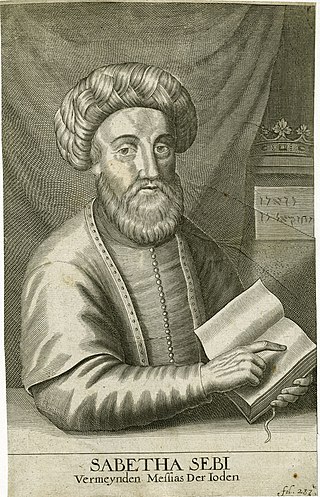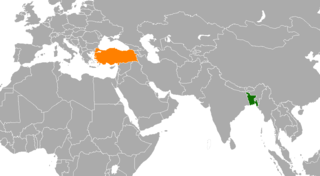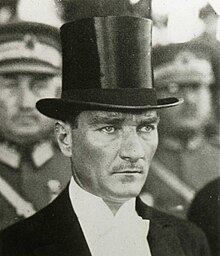The Republic of Turkey was created after the overthrow of Sultan Mehmed VI by Mustafa Kemal Atatürk in 1922 by the new Republican Parliament in 1923. This new regime delivered the coup de grâce to the Ottoman state which had been practically wiped away from the world stage following the First World War.

The Turkish Armed Forces are the military forces of the Republic of Turkey. The Turkish Armed Forces consist of the Land Forces, the Naval Forces and the Air Forces. The Chief of the General Staff is the Commander of the Armed Forces. In wartime, the Chief of the General Staff acts as the Commander-in-Chief on behalf of the President, who represents the Supreme Military Command of the TAF on behalf of the Grand National Assembly of Turkey. Coordinating the military relations of the TAF with other NATO member states and friendly states is the responsibility of the General Staff.

The Justice and Development Party, abbreviated officially as AK Party in English, is a political party in Turkey self-describing as conservative-democratic. It has been the ruling party of Turkey since 2003. Third-party sources often refer to the party as national conservative, social conservative, right-wing populist and as espousing neo-Ottomanism. The party is generally regarded as being right-wing on the political spectrum, although some sources have described it as far-right since 2011. It is one of the two major parties of contemporary Turkey along with the Republican People's Party (CHP).

Armenian genocide denial is the claim that the Ottoman Empire and its ruling party, the Committee of Union and Progress (CUP), did not commit genocide against its Armenian citizens during World War I—a crime documented in a large body of evidence and affirmed by the vast majority of scholars. The perpetrators denied the genocide as they carried it out, claiming that Armenians in the Ottoman Empire were resettled for military reasons, not exterminated. In the genocide's aftermath, incriminating documents were systematically destroyed, and denial has been the policy of every government of the Republic of Turkey, as of 2023, and later adopted by the Republic of Azerbaijan, as of 1991.

The Dönme were a group of Sabbatean crypto-Jews in the Ottoman Empire who converted outwardly to Islam, but retained their Jewish faith and Kabbalistic beliefs in secret. The movement was centered mainly in Thessaloniki. It originated during and soon after the era of Sabbatai Zevi, a 17th-century Sephardic Jewish Rabbi and Kabbalist who claimed to be the Jewish Messiah and eventually feigned conversion to Islam under threat of death from the Sultan Mehmed IV. After Zevi's forced conversion to Islam, a number of Sabbatean Jews purportedly converted to Islam and became the Dönme. Some Sabbateans lived on into 21st-century Turkey as descendants of the Dönme.

In Turkey, secularism or laicism was first introduced with the 1928 amendment of the Constitution of 1924, which removed the provision declaring that the "Religion of the State is Islam", and with the later reforms of Turkey's first president Mustafa Kemal Atatürk, which set the administrative and political requirements to create a modern, democratic, secular state, aligned with Kemalism.

Mehmet Cavit Bey, Mehmed Cavid Bey or Mehmed Djavid Bey was an Ottoman economist, newspaper editor and leading politician during the dissolution period of the Ottoman Empire. As a Young Turk and a member of the Committee of Union and Progress (CUP) had positions in government after the constitution was re-established. In the beginning of the Republican period, he was controversially executed for his alleged involvement in an assassination attempt against Mustafa Kemal Atatürk.

Neo-Ottomanism is an irredentist and imperialist Turkish political ideology that, in its broadest sense, advocates to honor the Ottoman past of Turkey and promotes greater political engagement of the Republic of Turkey within regions formerly under the rule of the Ottoman Empire, the predecessor state that covered the territory of modern Turkey among others.
Antisemitism in Turkey refers to acts of hostility against Jews in the Republic of Turkey, as well as the promotion of antisemitic views and beliefs in Turkey.
The Sèvres syndrome refers to a popular belief in Turkey that dangerous internal and external enemies, especially the West, are "conspiring to weaken and carve up the Turkish Republic". The term originates from the Treaty of Sèvres of the 1920s, which partitioned the Ottoman Empire among Armenia, Greece, Britain, France, and Italy, leaving a small unaffected area around Ankara under Turkish rule; however, it was never implemented since it was left unratified by the Ottoman Parliament and due to Turkish victory on all fronts during the subsequent Turkish War of Independence. Turkish historian Taner Akçam describes this attitude as an ongoing perception that "there are forces which continually seek to disperse and destroy us, and it is necessary to defend the state against this danger".

Bangladesh–Turkey relations are the bilateral relations between Bangladesh and Turkey. Both countries are members of the Organisation of Islamic Cooperation. Turkey has an embassy in Dhaka and Bangladesh has one in Ankara and a consulate in Istanbul.
Kadir Mısıroğlu (1933–2019) was a Turkish writer, publisher and conspiracy theorist. He was known for his staunch opposition to the early Kemalist regime of Turkey and advocating the restoration of the caliphate. Mısıroğlu's claims include that Joseph Stalin ordered his army to read the Quran on the sands against the Nazis, William Shakespeare being a secret Muslim, and that Karl Marx's Das Kapital was dictated by Jinn. He penned over 50 books, which include non-fiction, fiction, and poems. His works have been criticized for their approach, awareness and bias.

Erdoğanism or Tayyipism refers to the political ideals and agenda of Turkish President and former Prime Minister, Recep Tayyip Erdoğan, who became Prime Minister in 2003 and served until his election to the Presidency in 2014. With support significantly derived from charismatic authority, Erdoğanism has been described as the "strongest phenomenon in Turkey since Kemalism" and used to enjoy broad support throughout the country until the 2018 Turkish economic crisis which caused a significant decline in Erdoğan's popularity. Its ideological roots originate from Turkish conservatism and its most predominant political adherent is the governing Justice and Development Party, a party that Erdoğan himself founded in 2001.

The public image of Recep Tayyip Erdoğan concerns the image of Recep Tayyip Erdoğan, current President of Turkey, among residents of Turkey and worldwide.

Kemalist historiography is a narrative of history mainly based on a six-day speech delivered by Mustafa Kemal [Atatürk] in 1927, promoted by the political ideology of Kemalism, and influenced by Atatürk's cult of personality. It asserts that the Republic of Turkey represented a clean break with the Ottoman Empire, and that the Republican People's Party did not succeed the Committee of Union and Progress (CUP).
Mehmed Şevket Eygi was a Turkish journalist, writer, columnist, and Holocaust denier. He had Islamist-nationalist views, including some that were described as antisemitic or conspiracy theories by various sources. Eygi was imprisoned for many years, including for demagoguery in 2002 and 2006.

Ulusalism is a secularist, left-wing neo-nationalist ideology in Turkey that is influenced by Kemalism. Until the late 20th century, the word had been used as an equivalent of nationalism. In the mid-1990s, it transformed into a ideology led by left-wing nationalists, such as Attila İlhan, Mümtaz Soysal, and Doğu Perinçek.
Islamokemalism, also known as Green Kemalism is a Turkish-Islamic synthesist ideology which believes in the basis of Kemalism although either adds Islamism, or replaces secularism with Islamism. It can also refer to religious Turks who love Mustafa Kemal Atatürk and the Republic of Turkey.
Anti-Erdoğanism is a political movement in opposition to Erdoğanism, Recep Tayyip Erdoğan, and Erdoğanists. Anti-Erdoğanism has a presence in every Turkish political faction, ranging from the far-left to the far-right, as well as from liberals and socialists to conservatives, nationalists, and Islamists.











